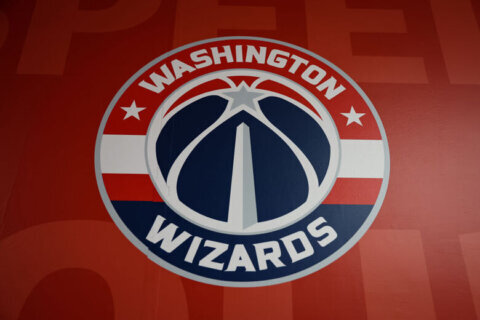WASHINGTON — Coming off an Eastern Conference Semifinal run last season, in which they played their best playoff ball, hopes were high for the Washington Wizards as they entered the 2015-16 season.
A thunderous sweep of the Toronto Raptors and a hard-fought series loss through injuries to their top two players against the top-seeded Atlanta Hawks hinted that the Wizards might be ready to break through into the elites of the league.
But with Wednesday night’s home game against the Miami Heat marking the halfway point of the regular season, the Wizards (19-21) are not only on the wrong side of the playoff bubble, they’re on the wrong side of .500.
So what’s gone wrong so far, and what needs to be done to fix it?
One of the reasons for hope was the smaller, quicker lineup usage and better floor spacing that head coach Randy Wittman employed to great success during the playoffs.
Washington’s offensive rating went from a middling 103.7, 22nd in the league, up to 105.8, which was better than any Eastern Conference playoff team except for the Cleveland Cavaliers who were beaten only by the Golden State Warriors in the finals. They did so while simultaneously running the third most efficient defense in last year’s playoffs, behind only the Warriors and Chicago Bulls.
But the success of last year’s postseason has not translated to this year’s regular season. Despite the best three-point percentage in the East (36.9) and a faster pace — 99.90 possessions per 48 minutes (fifth in the league) up from 16th last year (95.96) — the Wizards’ offensive rating ranks in the bottom half of the NBA. Nevertheless, the signs of a potential breakthrough are there.
“Pace on offense has been consistent, regardless of the lineup,” says WTOP Senior Sports Director Dave Johnson, who calls play-by-play for the Wizards.
“John Wall is the Wizards’ best player and Ramon Sessions has been the Wizards’ most consistent player from the start of the season. Keep in mind John’s November was not that great, but since then he’s been an All-Star.”
The falloff has come on the defensive side of the ball. Washington posted a top-five defense efficiency-wise last season. Right now, they’re nineteenth. The reasons for this have created a Catch-22 for Wittman’s team.
After finishing eighth in the league in rebounding last year, Washington has been abysmal so far this season, ranking dead last in the league at just 31.2 per game. And the problem isn’t confined to one end of the floor — the Wizards are bottom five in the league in both offensive and defensive rebounding.
“Nene’s absence — and at times, because of injury having to going really small — has impacted the boards,” Johnson says. “What can go unnoticed about Nene is how helps others get rebounds. He might not get the rebound, but he is the one that boxes out and allows others to get the rebound.”
Wizards’ forward Jared Dudley agrees.
“He’s probably our best low post scorer,” he says. “He can pass the ball, he is a physical presence defensively. It seems like even when he’s there, teams go for less offensive rebounds.”
But when the Wizards try to shore up rebounding by playing two big men at the same time, as they did Monday afternoon against Portland, sometimes the defensive game plan falls apart. The Blazers took 31 three-pointers and hit 17 of them, which one might consider lucky.
Many of those shots were wide open and completely uncontested, though, after the defensive rotation fell behind coming off basic pick-and-roll offense.
This has resulted in the Wizards allowing the third highest, three-point percentage in the league (.380) after being middle of the pack last year (.349). That may not seem like a huge deal, but over 1,885 attempts — the number of threes opponents put up last year — it translates to 60 more made shots. That’s 180 points, or almost 2.2 points per game.
There have been injuries other than just to Nene, namely to Bradley Beal, who has missed half the games thus far. But no one player’s presence or absence can be pointed to as the determining factor in Washington’s sluggish start.
Sure, Beal has played only 20 games, but the Wizards are just 9-11 when he has. Kris Humphries, a big man with a little more athleticism and who can stretch the floor, has missed 13 games, but Washington is only 13-14 when he’s been healthy.
It’s been more about the combination of players missing which has stalled the team’s progress, especially when they’ve been unable to even practice together.
“We’re just trying to weather the storm,” Dudley says of all the injuries. “I know once all the chips are available for us, I know that we’re going to be a tough team to beat.”
On an intangible level, the Verizon Center has not provided the comforts it has in past seasons. Washington’s 10-8 road record is the third best in the Eastern Conference, but the Wizards are an abysmal 9-13 at home, one of only three teams in the East in single digits in home wins. For reference, the team only lost 12 times at home all of last season, where they secured 29 of their 42 victories.
The good news is that the East is far more balanced than the West right now. The Wizards are just two games off the playoff bubble, and astoundingly just 9.5 games back of the top-seeded Cavs. In comparison, Denver is the eleventh seed out West, 21.5 games back of Golden State.
But six of Washington’s next eight games come against teams with winning records, capped off by a showdown with those 38-4 Warriors in D.C.
If they are going to salvage their season and ready themselves for another playoff run, they can’t afford to wait any longer to shore up their shortcomings.






